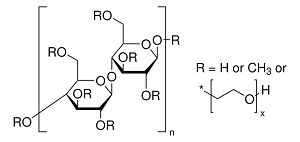Hydroxyethyl-Methyl Cellulose

Product Description
Hydroxyethyl-methyl cellulose (HEMC) is a versatile cellulose ether used in various industrial applications due to its unique properties such as thickening, water retention, and film-forming abilities.
Product:
Hydroxyethyl-Methyl Cellulose
CAS:
9032-42-2
Synonym:
Cellulose, 2-hydroxyethyl methyl ether; Methyl 2-hydroxyethyl cellulose
Structure:

Typical Characteristics
Appearance
White or slightly yellowish powder
Density
0.6- 0.75 g/cm3
Melting point
288-290 °C (decomposes)
Molecular Weight
Variable
Odor
Odorless
Purity
99%
Uses, Applications & Markets
Key applications
get a quote
We Offer Hydroxyethyl-Methyl Cellulose
in various grades
A few of the grades available are listed below:



Hydroxyethyl-Methyl Cellulose used in many
industry applications
Hydroxyethyl-methyl cellulose (HEMC) is a versatile cellulose ether used in various industrial applications due to its unique properties such as thickening, water retention, and film-forming abilities. Here's a list of some of its industrial uses:
- Construction Industry: HEMC is commonly used as a thickener and water retention agent in cement-based mortars, tile adhesives, and gypsum-based products, improving workability, adhesion, and durability.
- Paints and Coatings: It is used in water-based paints, coatings, and surface treatments as a thickener, rheology modifier, and film-forming agent, providing improved application properties and film integrity.
- Adhesives and Sealants: HEMC is employed in the formulation of adhesives and sealants to control viscosity, improve adhesion, and enhance workability, particularly in construction and woodworking applications.
- Pharmaceuticals: It is used as a binder, disintegrant, and viscosity modifier in pharmaceutical formulations such as tablets, capsules, and suspensions, improving drug delivery and stability.
- Personal Care Products: HEMC is used in personal care products such as shampoos, lotions, and creams as a thickener, stabilizer, and film former, enhancing product texture and performance.
- Food Industry: It is used as a thickening and stabilizing agent in food products such as sauces, dressings, and desserts, improving texture, mouthfeel, and shelf life.
- Oil and Gas Industry: HEMC is employed in drilling fluids and cementing operations in the oil and gas industry to control viscosity, prevent fluid loss, and improve wellbore stability.
- Ceramics Industry: It is used as a binder and thickener in ceramic suspensions and glazes to improve green strength, rheological properties, and surface finish of ceramic products.
- Textile Industry: HEMC is utilized in textile printing and dyeing processes as a thickener and rheology modifier, improving print definition and color uniformity.
- Agrochemicals: It is used in the formulation of pesticides, herbicides, and fertilizers as a suspension agent, improving product stability and dispersion.
- Paper Industry: HEMC is used as a coating additive and surface sizing agent in the paper industry to improve surface properties, printability, and ink absorption.
- Household Products: It is used in household products such as detergents, cleaners, and air fresheners as a thickener, stabilizer, and suspension agent, enhancing product performance and shelf appeal.